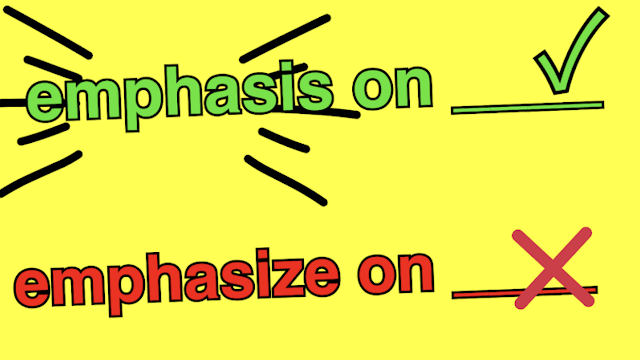特別注意:同一單字衍生的不同「版本」,也可能有不同文法特徵
我在3月28日的newsletter (這裡)中分享了,由同一單字衍生的其他單字,當要表達相同意思時,其文法特徵通常也是一樣的。
例如:
They decided to do it.
他們決定這樣做。
Their decision to do it surprised me.
他們要去做這事這個決定讓我感到驚訝。
第一句的動詞「decided」,連接了一個infinitive詞組「to do it」來完整意思,顯示出那個「已決定的行動」。
第二句中的名詞「decision」,是一個衍生自動詞「decide」的名形。從這例句可見,名詞「decision」就如動詞「decide」一般,都會被一個像「to do it」的infinitive 詞組修飾,以表達那決定了的行動是甚麼。
名詞組「their decision to do it」,包含了「to do it」去修飾「their decision」,意思是「他們要去做這事這個決定」。
清楚這點後,我們若要表達「他們要去做這事這個決定讓我感到驚訝」,便不會犯像以下的錯誤:
Their decision for doing it surprised me. ❌
Their decision to do it surprised me. ✔️
另一例子:
I subscribed to Ms. Charlotte’s channel.
我訂閱了Ms. Charlotte 的頻道。
Subscription to Ms. Charlotte’s channel is free.
Ms. Charlotte 頻道的訂閱是免費的。
第一句中的動詞「subscribed」,連接了一個以特定介詞「to」開始的prepositional詞組「to Ms. Charlotte’s channel」來完成整體意思,表達出所訂閱的對象。
第二句中,名詞「subscription」是由「subscribe」衍生而成的。我們看到這名詞版本也是被prepositional詞組「to Ms. Charlotte’s channel」修飾,以表達所訂閱的對象。
同樣地,我們清楚這點,便不會犯像以下的錯誤:
Subscription in Ms. Charlotte’s channel is free. ❌
Subscription to Ms. Charlotte’s channel is free. ✔️
多數情況下,由同一單字衍生的不同字形版本,在表達相同意思時都具有相同的修飾語/補充語。
然而,這也不是絕對的。因此當看到由同一單字衍生的不同字形版本,在表達相同意思時,有不一樣的文法特徵,我們便要格外留意了。
我能想到的一個明顯例子,是「emphasize」和「emphasis」:
He emphasized a key point.
他強調了一個關鍵要點。
He placed emphasis on a key point.
(文字直譯)他在一個關鍵點上放置了強調。
(這句的實際意思與第一句相若。)
第一句中,動詞「emphasized」(強調)有連接直接賓語「a key point」。這直接賓語正是那「被強調的對象」。
第二句中的名詞「emphasis」衍生自「emphasize」,卻在表達「被強調的對象」時,連接了一個「on」的prepositional詞組:「on a key point」
。這是因為「emphasis」是名詞,而名詞是無法像動詞一樣連接另一個直接賓語的。面對這些例子,我們要特別小心。如果我們就這樣假設了「emphasize」和「emphasis」擁有相同的修飾語,便很可能會犯像以下的錯誤:
He emphasized on a key point. ❌
動詞「emphasize」不像名詞「emphasis」般,需要連接「on」的prepositional詞組,而是需用連接直接賓語來表達意思。因此,「emphasize on…*」是不對的。
我們必須分辨清楚,動詞「emphasize」是靠連接直接賓語來指明對象的,而名詞「emphasis」則是靠連接「on」的prepositional詞組來表達:
He emphasized a key point. ✔️
He placed emphasis on a key point. ✔️
He emphasized on a key point. ❌
只要我們有系統地學習每個例句,便可避免犯上這些錯誤,更會漸漸記住了哪些單字擁有相同修飾語,哪些則沒有。
小練習
嘗試根據中文意思填充下列句子。
- They have a particular emphasis ___________________________ .
他們對效率 (efficiency) 有特別的強調 - They particularly emphasize ___________________________ .
他們特別強調效率
________________
(English version)
In the March 28 newsletter (link), I mentioned that words that are derived from the same word often share the same characteristics when expressing the same meaning.
For example:
They decided to do it.
他們決定這樣做。
Their decision to do it surprised me.
他們要去做這事這個決定讓我感到驚訝。
In the first sentence, the verb “decided” is completed by an infinitive phrase “to do it” to complete the meaning of “the action that has been decided.”
In the second sentence, there is the noun “decision,” which is a noun derived from “decide.” As we can see from this sentence, the noun “decision,” just like the verb “decide,” is also modified by an infinitive phrase like “to do it” to express “the action.”
The noun phrase “their decision to do it,” with “to do it” modifying “their decision,” means 他們要去做這事這個決定.
Knowing this, you can avoid making a mistake like the one below when you want to express “他們要去做這事這個決定讓我感到驚訝":
Their decision for doing it surprised me. ❌
Their decision to do it surprised me. ✔️
Another example:
I subscribed to Ms. Charlotte’s channel.
我訂閱了Ms. Charlotte 的頻道。
Subscription to Ms. Charlotte’s channel is free.
Ms. Charlotte 頻道的訂閱是免費的。
In the first sentence, the verb “subscribed” is completed by the prepositional phrase “to Ms. Charlotte’s channel” (with the specific preposition “to”). This expresses the meaning of “the target of the action of subscribing.”
In the second sentence, we see the noun “subscription,” which is derived from “subscribe.” We can see that this noun is also modified by a prepositional phrase “to Ms. Charlotte’s channel” to express “the target of the subscribing.”
Similarly, knowing this, you can avoid making a mistake like:
Subscription in Ms. Charlotte’s channel is free. ❌
Subscription to Ms. Charlotte’s channel is free. ✔️
It is very often the case that different derivations from the same word share the same modifiers/complements when expressing the same meaning.
However, it is not always the case, so you need to pay attention when you see that derivations of the same word use different modifiers to express the same meaning.
A clear example I can think of is “emphasize” vs. “emphasis”:
He emphasized a key point.
他強調了一個關鍵要點。
He placed emphasis on a key point.
(literal translation 直譯)他在一個關鍵點上放置了強調。
(The actual meaning of this sentence is similar to that of the first.)
In the first sentence, the verb “emphasized” (強調) has a direct object “a key point.” This direct object is the “target that is emphasized.”
In the second sentence, the noun “emphasis,” which is derived from “emphasize,” expresses the same meaning, the “target of emphasis,” with a prepositional phrase with “on,” “on a key point.” This is because a noun like “emphasis” cannot have a “direct object,” another noun, right after it like a verb can.
You need to pay particular attention to examples like this because you might easily make a mistake like the one below if you assume “emphasize” and “emphasis” have the same modifier:
He emphasized on a key point. ❌
The verb “emphasize,” unlike the noun “emphasis,” takes a direct object to express the target instead of a prepositional phrase with “on,” so this sentence is unnatural.
In this case, you need to make the clear distinction that the verb “emphasize” has a direct object as its “target,” whereas the noun “emphasis” is modified by a prepositional phrase with “on” to express the same thing:
He emphasized a key point. ✔️
He placed emphasis on a key point. ✔️
He emphasized on a key point. ❌
As long as you learn systematically from each example you see, you will be able to avoid these mistakes and slowly remember which derivations of the same words have the same modifiers and which ones don’t!
Mini Exercise
Try to fill in the blanks to express the meanings in Chinese:
- They have a particular emphasis ___________________________ .
他們對效率 (efficiency) 有特別的強調 - They particularly emphasize ___________________________ .
他們特別強調效率
________
Answers:
- on efficiency
- efficiency







Comments
Post a Comment